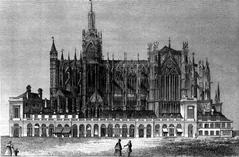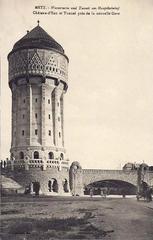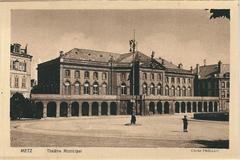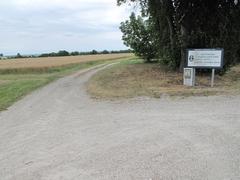Chapelle Sainte-Chrétienne de Metz: Visiting Hours, Tickets, and Travel Guide
Date: 14/06/2025
Introduction
Nestled in the historic heart of Metz, France, the Chapelle Sainte-Chrétienne de Metz stands as a testament to the city’s enduring spiritual, educational, and cultural legacy. Closely tied to the Congregation of the Sisters of Sainte-Chrétienne, founded in the early 19th century, this chapel embodies centuries of charitable mission, resilience, and devotion. Rich in artistic treasures—most notably its 19th-century stained glass windows by Maréchal, paintings by Hussenot, and an organ by Sauvage—the chapel offers visitors a serene and immersive experience.
Accessible and welcoming, the chapel remains active as both a place of worship and a venue for cultural events. This comprehensive guide gathers essential information, travel tips, and historical context from authoritative sources, ensuring that your visit to the Chapelle Sainte-Chrétienne de Metz is meaningful and memorable (Journées du Patrimoine; INRAP; promenade.temporelle.free.fr).
Table of Contents
- Introduction
- Origins and Foundation
- Architectural Significance
- History and Notable Events
- Community and Cultural Role
- Visiting Hours, Tickets & Practical Information
- Unique Features and Visitor Experience
- Archaeological and Urban Context
- Artistic and Liturgical Heritage
- FAQ
- Conclusion & Summary
- Sources and Further Reading
Origins and Foundation
The story of the Chapelle Sainte-Chrétienne is inseparable from the Congregation of the Sisters of Sainte-Chrétienne. Founded in 1807 by Anne Victoire de Méjanès (Sister Sainte Chrétienne) with the support of Bishop Jauffret, the congregation’s early mission focused on education and care for the sick and marginalized. The community quickly settled in Metz and began to expand its charitable and educational work, with the number of sisters and institutions growing rapidly in the early 19th century (promenade.temporelle.free.fr).
Architectural Significance
Constructed in 1848 during a period of religious revival, the chapel is a fine example of 19th-century ecclesiastical architecture. The exterior, likely built with the iconic yellow Jaumont limestone, blends harmoniously with the surrounding historic buildings. Inside, the space is marked by a single nave and altar, fostering communal worship and quiet reflection. Artistic highlights include vibrant stained glass windows crafted by Maréchal, paintings by Hussenot, and an organ by Sauvage (journees-du-patrimoine.com).
History and Notable Events
Throughout its history, the chapel has stood firm through periods of upheaval. Notably, a convent building was destroyed during World War II, with reconstruction completed in 1954. The congregation’s mission evolved to meet contemporary needs, including the establishment of a retirement home for elderly sisters and laypersons.
The chapel has also played a role in significant community events, such as the laying of the oratory foundation stone in 1900 and hosting public oratories dedicated to the Sacred Heart of Jesus. Today, it remains a living site, hosting services, concerts, and heritage events (promenade.temporelle.free.fr).
Community and Cultural Role
Beyond its religious function, the chapel is a pillar of the Sablon district and Metz as a whole. The sisters’ dedication to education and healthcare has left a lasting impact on the city’s social fabric. The chapel regularly participates in cultural initiatives, including the European Heritage Days (Journées du Patrimoine), when it offers guided tours, lectures, and exhibitions for the wider public (journees-du-patrimoine.com).
Visiting Hours, Tickets & Practical Information
- Location: 60 Rue Dupont des Loges, 57000 Metz, France (Le Parisien)
- Opening Hours: Generally open Tuesday through Sunday, 10:00 AM to 6:00 PM. Closed Mondays and certain holidays. Note: Regular public access may be limited outside of special events; always check current schedules via local tourism resources or the congregation.
- Admission: Free of charge. Donations are welcomed during public events and guided tours.
- Accessibility: The chapel is wheelchair accessible, with ramps and facilities for visitors with reduced mobility.
- Guided Tours: Available during European Heritage Days and by appointment. Tours are often led by congregation members and provide deep insight into the chapel’s history and mission (By Night).
- Facilities: As an active place of worship, facilities are limited—no on-site restrooms or permanent gift shop.
- Getting There: Easily reached by public transport (Metz-Ville station ~15 min walk), local buses, or on foot from city center. Limited street parking is available.
Unique Features and Visitor Experience
- Stained Glass Windows: Maréchal’s windows create spectacular light, especially in the morning and late afternoon.
- Organ & Concerts: The Sauvage organ is featured in occasional classical music concerts.
- Workshops & Lectures: Special events, especially during heritage days, further enrich the visitor experience.
- Gardens: The adjacent Jardins des Sœurs de Sainte-Chrétienne offer a tranquil space for reflection (mapcarta.com).
- Nearby Attractions: Centre Pompidou-Metz, Parc Sainte-Chrétienne, and Metz Cathedral are all within walking distance (Tourisme Metz).
Archaeological and Urban Context
Archaeological investigations by INRAP have revealed that the site hosts layers of historical foundations—from a Carmelite convent in the 17th century to the remnants of the Abbey of Saint Clément and country residences. These findings underscore Metz’s complex urban and spiritual evolution (inrap.fr).
Artistic and Liturgical Heritage
The chapel’s artistic legacy includes Maréchal’s stained glass, Hussenot’s paintings, and the Sauvage organ, all contributing to its unique liturgical atmosphere. These works not only enhance worship but also attract art and architecture enthusiasts keen on the religious heritage of Lorraine (journees-du-patrimoine.com).
Frequently Asked Questions (FAQ)
Q: What are the visiting hours?
A: Generally Tuesday–Sunday, 10:00 AM–6:00 PM, closed Mondays and some holidays. Always verify ahead as hours may vary.
Q: Is there an entrance fee?
A: No, admission is free. Donations are appreciated.
Q: Is the chapel wheelchair accessible?
A: Yes, there are ramps and facilities for visitors with reduced mobility.
Q: How can I arrange a guided tour?
A: During European Heritage Days or by prior appointment with the congregation or Metz tourism office.
Q: Are photos allowed?
A: Permission is required, especially during services or private events.
Q: Are there nearby attractions?
A: Yes—Centre Pompidou-Metz, Metz Cathedral, Parc Sainte-Chrétienne, and more.
Conclusion & Summary
The Chapelle Sainte-Chrétienne de Metz offers a rare combination of historical depth, artistic beauty, and living tradition. Whether you’re drawn by its architecture, spirituality, or the story of the Sisters of Sainte-Chrétienne, the chapel provides a rewarding and contemplative experience. Plan your visit around special events for the fullest access, and consider combining your trip with other Metz historical sites to enrich your understanding of the city’s vibrant heritage.
For up-to-date information, event listings, and visitor tips, consult the Metz tourism website or contact the congregation directly. Enhance your experience with the Audiala app, offering guided tours and insider insights on Metz’s cultural landmarks.
Sources and Further Reading
- Chapelle Sainte-Chrétienne de Metz: History, Art, Visiting Hours & Tickets for Exploring a Key Metz Historical Site, 2024, Promenade Temporelle
- Journées du Patrimoine: Chapelle Congrégation Sœurs Sainte-Chrétienne, 2024
- Institut national de recherches archéologiques préventives (INRAP), 2024
- Visiting Chapelle Sainte-Chrétienne de Metz: History, Architecture, and Visitor Guide, 2024, La Vie des Saints
- Chapelle Sainte-Chrétienne Metz: Visiting Hours, Tickets & Visitor Guide, 2024, By Night Metz
- Official Metz Tourism Website, 2024








